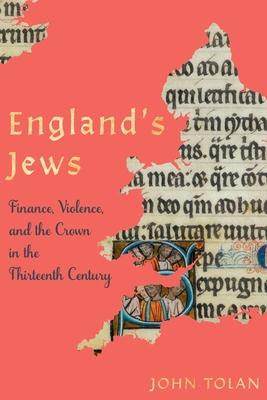In 1290, Jews were expelled from England and subsequently largely expunged from English historical memory. Yet for two centuries they occupied important roles in medieval English society. England's Jews revisits this neglected chapter of English history--one whose remembrance is more important than ever today, as antisemitism and other forms of racism are on the rise.
Historian John Tolan tells the story of the thousands of Jews who lived in medieval England. Protected by the Crown and granted the exclusive right to loan money with interest, Jews financed building projects, provided loans to students, and bought and rented out housing. Historical texts show that they shared meals and beer, celebrated at weddings, and sometimes even ended up in bed with Christians. Yet Church authorities feared the consequences of Jewish contact with Christians and tried to limit it, though to little avail. Royal protection also proved to be a double-edged sword: when revolts broke out against the unpopular king Henry III, some of the rebels, in debt to Jewish creditors, killed Jews and destroyed loan records. Vicious rumors circulated that Jews secretly plotted against Christians and crucified Christian children. All of these factors led Edward I to expel the Jews from England in 1290. Paradoxically, Tolan shows, thirteenth-century England was both the theatre of fruitful interreligious exchange and a crucible of European antisemitism.
Book
England's Jews: Finance, Violence, and the Crown in the Thirteenth Century
by John Tolan
(Write a Review)
Hardcover
$45.00
In 1290, Jews were expelled from England and subsequently largely expunged from English historical memory. Yet for two centuries they occupied important roles in medieval English society. England's Jews revisits this neglected chapter of English history--one whose remembrance is more important than ever today, as antisemitism and other forms of racism are on the rise.
Historian John Tolan tells the story of the thousands of Jews who lived in medieval England. Protected by the Crown and granted the exclusive right to loan money with interest, Jews financed building projects, provided loans to students, and bought and rented out housing. Historical texts show that they shared meals and beer, celebrated at weddings, and sometimes even ended up in bed with Christians. Yet Church authorities feared the consequences of Jewish contact with Christians and tried to limit it, though to little avail. Royal protection also proved to be a double-edged sword: when revolts broke out against the unpopular king Henry III, some of the rebels, in debt to Jewish creditors, killed Jews and destroyed loan records. Vicious rumors circulated that Jews secretly plotted against Christians and crucified Christian children. All of these factors led Edward I to expel the Jews from England in 1290. Paradoxically, Tolan shows, thirteenth-century England was both the theatre of fruitful interreligious exchange and a crucible of European antisemitism.Hardcover
$45.00